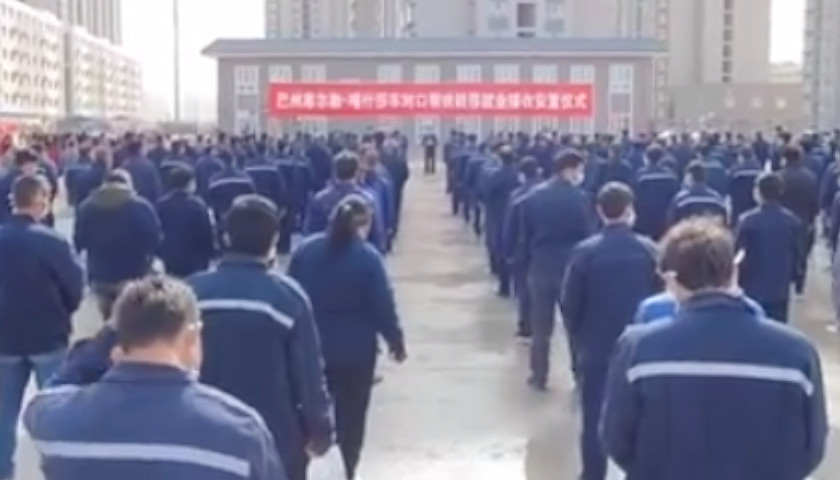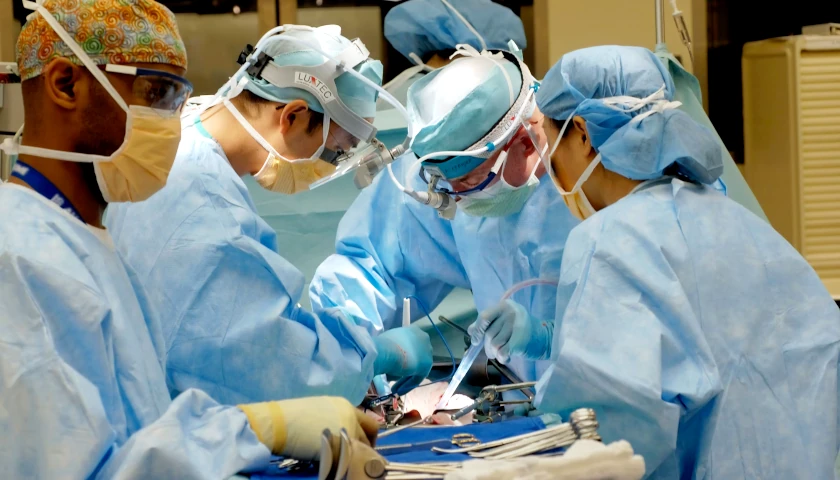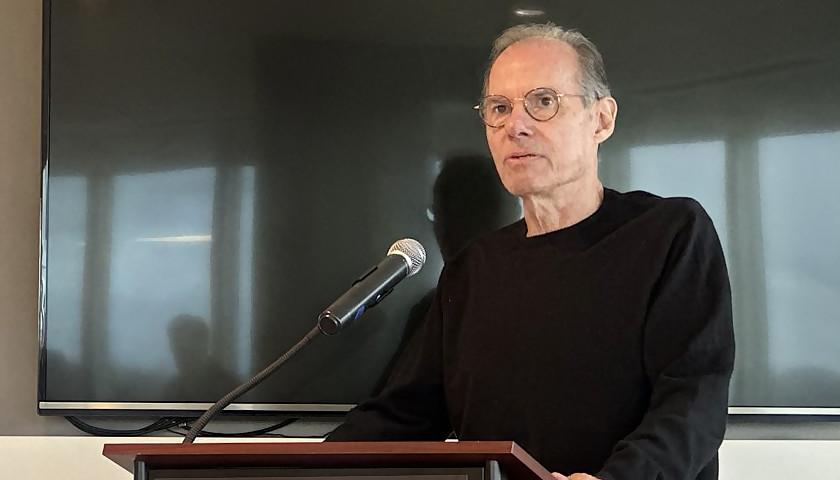by Ethan Gutmann
It’s morning in Istanbul, but Joseph is reliving his morning routine in the camp, before the 16-hour shift starts. After the prisoners had sung Communist songs for their breakfast, the Chinese guards played a video for them shot in cinema verité style. It began with Chinese plainclothes agents tackling Uyghurs, cramming them into unmarked cars, and pulling bags over their heads.
Then, the camera would pan away, revealing, not China, but a foreign street with signs in German, Arabic, or English. Joseph says the film was a tease: Run away. Please try it. We’re everywhere. Even Washington, D.C.
“Will there be television cameras filming us in Washington?”
“Could be, Joseph. Look, you are the first Christians to make it out of the camps and into America. The first Kyrgyz family. Maybe even the first intact family.”
“You will make sure there is no Chinese media there, right?”
“I can’t do that Joseph. The U.S. is a free country.”
Joseph’s wife, Julie, can’t hold back: “Can we cover up our faces then?”
“No.”
Joseph smiles in a sad way: “Tell me again. Why do we have to do this?”
“It’s called ‘media training.’ We are just trying to get you used to the camera. Look Joseph, the press is interested in you. If the press weren’t interested, we could be waiting in Istanbul much longer.”
Joseph’s birth name is Ovalbek Turdakun. I use his adopted Christian name because I don’t want to jinx his run of nearly supernatural luck. The first miracle was that Julie got him out of the Xinjiang camps in under a year. Second, with their 9-year-old son, the family crossed the Chinese border into Kyrgyzstan, where I first interviewed him. Third, the “Christmas Miracle,” – on Dec. 15, 2021, 48 hours before the bag was scheduled to go over Joseph’s head, my friend Conor Healy got the family out of Bishkek and on a flight to Istanbul.
Our conversation is being shared remotely with a British media expert. Sensing that Joseph is warmed up, she speaks Chinese:
“Joseph, there’s one question that any American reporter will ask you: We’ve all heard from the Chinese government that the ‘re-education camps’ are over. That you have all been retrained. Now they have shut the camps down. There is no more forced labor. Everyone has gone home.”
Joseph is silent for a moment. Then he starts sketching on the notepad in front of him, and his voice drops: “Let me tell you about my camp, about the buildings where I lived.”
“The walls were 18 inches thick. Exactly. Reinforced concrete. I believe it has a metal frame inside. The cell doors are thick like that too, just a few inches less, but they are metal. Like a bank vault, you see? Each door has eight electronic locks: two to each side, top, bottom. When they release that door, you could hear the bolts snapping back.”
Joseph drums his fingers on the table: “One after the other. Now, the door can open. But there is a massive steel bar in the middle. This bar holds the door to the concrete frame. So, you really have only a crack in the door, just big enough for a prisoner to duck his head underneath, just wide enough so they could shimmy through. Every prisoner took two minutes to get through that door, nearly an hour to empty the cell – on average, you understand. But it didn’t matter to the police how long it took. Everything they did was about preventing escape. All the corners were rounded, so we couldn’t hit our heads on a sharp corner and then somehow run away from the hospital. Each prisoner had three police assigned to them; if you were big and fat, you got five.”
Joseph explained that even if the police magically disappeared during a natural disaster, the robust walls ensured that the camp would become a mass tomb: “Even a 7.0 earthquake could not free us from such a structure.”
“Do you think anyone builds something like that to last a year or two?” Joseph asked, his gaze falling on the screen, then on me. “No, of course not. This is for the future. This is permanent.”
It was our last media training. Three weeks later, we flew to Dulles International Airport. U.S. government officials greeted the Turdakun family at the immigration line with Washington Nationals baseball caps and freshly baked chocolate chip cookies. Miracle #4: America came through. Yet we hadn’t put this much effort into rescuing Joseph because he had Chinese Communist Party documents or nuclear secrets. Leaving aside the raw humanitarian pull of a family about to be ripped to shreds, we rescued Joseph because he has a superpower: total recall, a nearly photographic memory of the internal camp layout – the fleeting glimpse of the rape room, and the exact location of every Hikvision camera, even the one above the toilet. Every day, Joseph whispered questions to his cellmates about the camp’s factory, until one of them hissed: “You are trying to form numerical estimates, aren’t you? Stop it. You’ll get us all killed.”
Hasha
Seeking out Uyghur refugees – with legal status or otherwise – I traveled to Central Asia and Turkey. Local authorities see this sort of investigation, quite correctly, as bad for their relations with China, so I approached the refugees gingerly. Most had family in China, so I did not demand names. I recorded their testimony, sent it out securely, and deleted it from my mobile device.
I interviewed an elderly Uyghur man – classic white beard, steady gaze – in a southern Kyrgyz village not far from Osh. Growing up in East Turkestan (the Chinese renamed it “Xinjiang,” literally “new land”), local Chinese officials ordered him to work about three days a month back in 1985. When I asked him the nature of his work for China, he grinned at the formality of my question and said, “I shoveled shit for the Party.”
A Chinese intellectual or “black class” who had been sent to the countryside during the Cultural Revolution might have talked about such an experience for hours. Even Xi Jinping mentions getting manure splashed on his face as a village party secretary. For elderly Han Chinese, these are rite-of-passage humblebrags. Their children won’t ever have to work in such jobs. Yet not a single Uyghur or Kazakh told me their story that way.
“From that time in my life, I know we have hasha – hasha means forced labor – in my village.” Parach describes it as a way of paying taxes for those with little money. Every year Uyghur families would pick “a chosen one” to go to the fields for a couple of weeks, or perhaps raise money for a bribe. If the chosen one or the bribe didn’t show, officials would hit the family with a fine. “It was a normal thing for the Uyghur population that we have to work for free, for the state … just traditional, normalized hasha. And we did not disagree with this. Never.”
The hasha itself often had little value in total crop yield, but for the local Party members, forced labor created a tradable currency.
Yet Parach saw this petty bureaucracy as a small price to pay if the Uyghurs were left alone: two days of work a month per family. Confiscation of land as a last resort. No armed guards patrolling the cotton fields. No son separated from his family for more than a month. Uyghur women don’t do hasha.
In January 1994, Parach says, the wind shifted: “A frigid, bitterly cold winter. My friends and I were sliding on the frozen pond on our way to hasha.” At the assembly point, “Chinese authorities commanded us ‘to clear every irrigation gulley of ice.’”
The young men thought they were joking: “This might make sense somewhere else. But there was no water coming into the irrigation system at all. In Kashgar, the winter is bone-dry. In the spring, fresh rain would melt the ice in a couple of hours.” The boys speculated that this was some sort of game “to keep us busy, to keep us from gathering together, or to keep us from plotting against the state.” One boy boldly said, “There is no real reason to clear the ice.”
The Chinese response was to enlist the entire village. “We spent three days using pickaxes and shovels on four kilometers of ice that had formed on the irrigation channel … every family had to clear five to ten meters.” After that, “Hasha became endless. The authorities ordered five days of work a month … but now it was make-work: poorly timed cotton harvests, digging soil that was never planted … just making sure your time was never your own.”
“Yasin,” a farm boy with crinkly laughing eyes, noticed the shift that summer: Chinese bosses withheld drinking water in the cotton fields just to “break the workers.”
On Feb. 5, 1997, Chinese armed forces fired on Uyghur protestors in Ghulja. If you include the follow-on mass arrests, Bahtiyar Shemshidin, a former Chinese Public Security Bureau agent in Ghulja, told me that internal police estimates were 400 dead. In the wake of Ghulja, a Muslim imam and a farm boy claimed that the hasha obligation per family doubled to 70 days a year. Yasin watched as Chinese authorities ordered Uyghurs to prepare fields for cotton planting. “Then Han Chinese entrepreneurs, who had apparently made a deal with the local authorities, came and planted the cotton.”
In Aksu prefecture, “River Boy” grew up in a Uyghur village on the banks of the Muzat river. He spoke in awe of its “intense chill” and its “extremely fast and powerful current, always shifting.” In 1998, when River Boy was 17 years old, the village controllers announced that the Muzat would be diverted and ordered the Uyghur boys to the riverbank. Lay metal tripods across the river, the boys were told. This was the easy work, not the barn-raiser.
Yet the tripods were as heavy as tank traps, requiring two boys to lift them, even for a few seconds, and this work was potentially underwater. So the stone-faced boys stood still, while the Uyghur elders drifted down to the river and talked loudly among themselves. “They could use nearly any heavy machinery to dig – or to move foundations into the river – or even dump stones and gravel in the river. But instead, they want to use our boys!” The controllers listened, huddled, and abruptly declared the big push would start the following day.
That morning the boys and the elders took their places. On cue, a detachment of police marched in and “a Chinese policeman shot his pistol into the air.” The elders went silent as “three policemen pushed a boy into the river.” Panicking, the boy eventually found his footing, balancing against the changing current, and boys began moving the tripods beyond the river’s edge. As two boys made their way a few yards into the Muzat, the tripod sunk deep into the riverbed. Their grip wildly distorted, everyone watched the boys gasp and submerge, gasp and submerge – eyes bulging. Then, like a double barrel, they shot down the river. “The remaining boys … struggled back to shore. Some were crying. ‘We don’t want to go back. We’re all going to get killed.’”
A Uyghur search party headed down the Muzat. A few hours later they carried the boys’ corpses into the village center where a thousand Uyghurs were waiting. Five police cars drove in. Again, a single policeman called for order and fired his pistol in the air. This time everyone screamed: “Shoot us, shoot us! Look how many of us are here! How many of us do you think you can kill?” The police slowly backed away. The Uyghurs swarmed the police detachment, ripping the guns from their hands. The policeman who had fired the first shot of the day was tied to the front of a tractor. The high-water mark of the Muzat incident was a Uyghur farmer driving the policeman into the river and submerging him over and over “until he begged for his life.”
Before sundown, 30 armed soldiers marched into the village center and carried out house-to-house raids. “Separatists” were driven away in the cool early hours and sentenced to three years in prison.
There was no inquiry into the deaths, the child labor, or the diversion plan. Local hasha continued, but the projects were quietly scaled down. On the riverbank, the tripods rusted like a brutalist memorial to the fallen. There was never another attempt to divert the wild Muzat.
Higher “Education”
In September 1998, 13-year-old Meryem Sultan was waiting in line for the three buses which would take her Uyghur classmates to an abandoned prison from the Tarim Laogai (Tarim forced labor). There the students would unroll their bedding onto plastic sheets that had been rolled onto the cement floor, and they would pick cotton in the fields for a month.
Yet only a single bus arrived. The school administrators of “Onsu County No. 1” ordered all three classes to cram into it. During the chaotic four-hour drive to the cotton fields, a 15-year-old boy, “Ali,” said he couldn’t breathe and collapsed. The bus drove on for an hour before stopping. Meryem watched as Ali was taken to a hospital.
Meryem was “a good picker” who always fulfilled the daily cotton quota. And Ali was her best friend’s older brother. That night, as she lay on the floor of the abandoned prison that was their dormitory, she imagined Ali resting too. Meryem knew Han Chinese students were sleeping at home tonight, but hasha was “just part of going to school.” In four weeks, she’d be home too.
The next day they told her Ali was dead, but his family got a thousand dollars.
Years later, when Meryem enrolled in Beijing University, she asked the teacher, “Will we have to carry out any hasha?” and everyone burst out laughing. “It made me rethink why we had to obey all these strict rules … to train us to be like machines, to obey without question whatever orders we received from above, to make us listen only to the Party.”
The Party recently transformed Meryem’s old middle school into a concentration camp. Meryem used to see “Ali in her dreams” – but that was long ago.
“Yet before we even learned the exam results, I, along with 25 other young female students, were guided into a large hall,” she recalled. The head teacher announced they had been chosen for “a wonderful opportunity: free training courses, such as Chinese language studies, to prepare you for work in mainland Chinese factories.”
There was silence. “None of us had agreed to take part in any training courses,” Rabiya said, “But now we were locked in the hall. Our teachers surrounded us. Watching us. Even when a girl had to go to the toilet, two teachers would escort her there and back.” To avoid conflict with parents outside the school, the teachers ran out the clock. Twelve hours later a bus arrived, and the girls were taken to the “Vocational Training High School of Payzawat County” in darkness. Three weeks later, the girls were forced onto a guarded train. In Tianjin, Chinese managers drove them to a large factory compound and said: “You are group number three.”
In the same county, a 16-year-old Uyghur woman – “Graduation Girl” – was told to collect her diploma in a “special ceremony.” Yet after the students filed into the auditorium, they noticed security guards locking the doors. The head teacher raised his hands and waited patiently until the whispering stopped. Then he said, “You will be going to inner China. And you will work.”
Parents gathered around the school entrance and a representative spoke: “Your daughters must go to the fabrics. But they will be carefully supervised and completely safe.” The new hasha requirement for each Uyghur family is one year’s work, he explained. So, if you leave and go home right now? Your family will be free from hasha until your daughter returns. Yet if “a girl does not go to the fabrics … if her parents try to get in the way … the days of hasha will increase.”
Rabiya is certain that 210 Uyghur girls sewed male shorts on an assembly line. But she can’t read Chinese characters, so the brand of clothes, the factory name, and its location was a mystery. But it didn’t matter. They were forbidden to leave the compound. They never even saw the Chinese workers – Rabiya suspects they were on a piece-rate, so they worked normal hours. “The only Chinese working at night” were the managers. “We worked in a big hall, with one camera in the center – it would rotate to watch anyone it liked – and cameras on the ceiling in all four corners.” To use the toilet, they had to hold up a metal card. If the surveillance camera didn’t see the card, “we were all punished by losing our salary.”
The factory administrators told the girls their salary was the equivalent of $50 a month. Two weeks later, they were told “You all came to Tianjin by train. So now you have to pay your fare.” Six months later, they were told, “You have to pay for your return train fare.”
So, the salary was really $35 – assuming they made quota: “Some days we had to finish 800 items, other days 700 … We usually worked until 12 p.m., or even 1 a.m. You know, we had to be up before 6 a.m. But they didn’t care if we were exhausted. Even when we were sick.” Every 15 days, the girls got a day off to wash their clothes. Rabiya said, “We were still very young, and we had never been separated from our family for so long. Every time we called our parents, we ended up weeping.” Rabiya’s mother would say: “Be patient, the year will pass so quickly. By the grace of God, you will come home soon.” But her voice would crack, so Rabiya knew she was fighting back her own tears.
In early September, Graduation Girl was put on a “special train with no locals, fully controlled. There were about 150 of us in each car, plus teachers and guards.” The girls were taken to a factory compound in Beijing to sew fashion bags for Da Xing, a Chinese clothing company, for 10 to 12 hours per day. The meals were sustenance-level to coax the girls into purchasing snacks at the company food stands. “There were no official violations or humiliations of Uyghurs … but there was constant racism. The Chinese workers would always say: ‘You stink of sheep’s oil.’ They treated us in this way.”
“They have to keep working,” was the reply. “They cannot leave the job now.”
Uncle made the first move – an arm grab. There was a grapple, a bite, a counter-bite, and then the Chinese beat Uncle “quite severely.” That night, a couple of the Uyghur girls made secret plans to escape, but discovered they couldn’t legally board a train to Urumqi. A truce settled in.
One night at 1 a.m., Uncle spoke to the factory directors again: “It’s too late now. We must stop and let these children go and rest, as they’re working tomorrow as well.”
“They have to finish the order!”
“If you don’t allow them to rest, how can they continue working!?”
The shoving began again. Then the Chinese surrounded Uncle, knocked him down and stomped on him “without mercy.” Uyghur girls began spontaneously throwing pieces of machinery. But the Chinese were distracted – was Uncle dying?
While the ambulance was enroute, it all sunk in: Uncle was gone, maybe dead – the girls’ only connection to Kashgar, to Payzawat County, the only thing stopping the Chinese from kidnapping them all. The girls came together on the factory floor, holding each other, moaning, fainting, weeping – praying for someone to save their lives. Before this, all Rabiya wanted was her turn to call home. Now, Rabiya’s deepest fear hit her: I will never see my family again.
The next morning, a contingent of the Uyghur administrators came to the dorm. The girls stood together and declared in solidarity: “We won’t work anymore.”
“You have a one-year contract,” they were told. “It’s not over. You have to work, you must continue. The factory has a huge emergency order right now. You must fulfill it.”
With no money, no escape, and Uncle in the hospital, the girls went to work in silence. When the year was done, Rabiya went home on the train. Her parents made a bribe, it was accepted, and Rabiya never went back to inner China.
Rabiya’s niqab was well-pressed. The way Rabiya told me her story tells me that she does not fear local imams, much less the peering eyes of an American Jew. I suspect that Rabiya wore her niqab because she trusts no one.
In the summer of 2008, the Chinese authorities put Graduation Girl and her fellow workers on a train back to Kashgar. To squelch the unfounded local rumors that she had been violated in inner China, – and to prevent her from being pulled into a second year of forced labor – a farm boy, “Batur,” married “Graduation Girl” one year later.
A happy ending was still possible back then. Recall the reassurances – “carefully supervised,” and “completely safe” – that the school gave to the parents. Despite Rabiya’s terror of kidnapping and never seeing her family again, Uyghur females weren’t systematically targeted for sexual trafficking at that time. Rather than spooning with co-workers to keep warm on a cement floor, Rabiya and Graduation Girl slept on individual bunks, 12 women or six women to a room respectively. Both women ate halal food. No one was forced to eat pork. No visible microphones and cameras in the dormitory or the toilets. Chinese guards didn’t rape them. A decade later, all of these paper-thin protections would be gone.
For a Uyghur farmer, the land is everything. Now Batur had to count the Chinese spoils. Batur doesn’t remember the numbers. Yet as the Uyghur lands receded, working the new Chinese fields became a 100-day annual commitment fulfilled by Uyghur farm families.
A Uyghur cook, Yusef, ran a mobile food unit in a vast bingtuan – Chinese paramilitary installations that promote Han Chinese settlement. Yusef describes his bingtuan as “endless, endless fields. Like an endless sea. You cannot see the border … It’s too far. And the fields are white with cotton, and all of the workers are Uyghurs. Only Uyghurs.”
Many were Uyghur college students, ripped out of the classroom and forced to listen to motivational speeches in the barracks: “‘You need to thank the University from your soul for giving you this guidance from the Chinese Communist Party,’ – shit like that.” But Yusef says it all came down to armed Chinese soldiers patrolling the fields. In July 2009, Urumqi exploded briefly into race riots between Uyghurs and Han Chinese. Before July, Yusef said, “The soldiers kept up a professional exterior.” After July, the soldiers’ “racism” was openly liberated. “We don’t work with Uyghurs,” they said with contempt.
Beginning in 2015, the Party ordered the camp construction. A mass surveillance structure – using human checkpoints and electronic readers which can remotely determine a human being’s race and stress level – became standard. By the end of 2016, one million people were detained in the camps. Initially, the camps were indoctrination. Over time, they would become housing for forced labor.
In 2019, I was interviewing camp refugees in Kazakhstan. On the women’s side, there is a group of teenagers about 18 years old who can leave the camps early. The “graduation” announcement is often made at lunch. Camp administrators mention farm work, or fabric production, or that “these girls will be going to work out East at a factory.” There’s nothing hidden here; light applause is encouraged. The Party denies mass incarceration, forced psychoactive medications, torture, systematic rape, forced sterilization, shaving of hair for Chinese wig exports, mass deportation of Uyghurs abroad, and systematic state-controlled harvesting. But forced labor was simply rebranded as a jobs program.
Born Slaves, Branded as Terrorists
Back in Turkey, “Abraham” caught the full scale, simply by giving me a clipped rundown on his family. His wife and all of his children are incarcerated and working or confined to orphanages. His three brothers are in prison, one picking cotton, the others producing cement. I asked Abraham if he ever speaks with his family. He replied: “No one is home. Children and old people only. Everyone is in the camps being forced to work. Or in orphanage. Or in prison.”
What Abraham is describing has a name: chattel slavery. One is born a slave, an asset, with no rights to a family. The auction blocks are electronic these days, but the end result is the same: rip up the family, break up the culture, and reduce the individual to a pack mule.
There was nothing inevitable about this. The CCP had off-ramps: the “Go West” project, for example. Build modern infrastructure, elicit foreign funds, get some money in the Uyghurs’ pockets. They will assimilate. We may never know if there were factions of the party that had relatively good intentions, however patronizing, for the Uyghurs and Kazakhs, because the real key date for the party is not the Ghulja incident, or the Kunming Train Station attack, or the Urumqi riots. The only date that matters is 9/11.
Portrayed as CIA proxies on Sept. 10, the party re-branded Uyghur separatist groups as Islamic terrorists on Sept. 12. There will always be young men who will pick up a gun – I interviewed a Uyghur who had trained as a rebel soldier – but to concentrate exclusively on action and reaction is to miss the performative aspect of the Party’s war on terrorism. The target audience is Han Chinese. The war is not meant to be won, but to create an enduring justification for the Chinese State’s assault on the Uyghurs.
Why? It’s hardly definitive, but one can find patterns in refugee testimony, particularly by what’s missing; Islamophobia, for example, barely comes up. Or the Hui Muslims of China. I’ve been told the Hui are stricter in their Muslim practice than the Uyghurs. But the Hui speak Mandarin, so they don’t seem to appear in the camps. Yet nearly half the refugees mention Han Chinese racism.
That rings true for me. When I was in Beijing, my Chinese business counterparts knew that a good time meant a Uyghur club. The fun was daring each other to eat boiled donkey penis while watching supposed “Uyghur women,” in Kismet garb, twist and turn. Good music. The best in Beijing. But it all felt transgressive, segregated, and exploitative – perhaps like “Negro jazz clubs” in the Roaring Twenties. Han Chinese racism is real – not the inflated currency of micro-aggression that we worry about in the West – but genuine “these people are monkeys” sort of racism.
The question is, what does the future of Uyghur employment really look like? Prison labor is universally overlooked. It’s the last stop on the human rights train. Yet while raw numbers of Uyghurs in the camps are currently decreasing, many have been transferred to prisons – and the camps are increasingly focused on forced labor outputs.
Ali, a man in his early 40s, is simultaneously taut and wrinkled, underfed, with all-knowing eyes, exactly what you might expect from a man who lived through what he calls “12 years of slavery … I’ve never been paid by the Chinese state for any of the work that I’ve done.”
Ali was detained in 1998, interrogated for two years, and then worked continuously until 2012.
His initial job was in “First Prison factory:” 20 buildings, 5000 workers, all producing cement floor tiles. Ali stacked, loaded, and unloaded. He was careful, but the problem was the sheer weight; half the workers had broken legs, feet, or both.
Ali’s next job was cutting and polishing novelty stones, with little physical strength required, simply setting stones into metal frames, using “a big pot, filled with liquid glue.” They had masks, but the smoke from the glue combined with chemicals to make the stones shiny was “toxic.” Ali had chronic dizziness, disorientation, and “my eyes constantly watered, if I didn’t have the mask on really tight.”
His final job was an assembly line of 150 people making trousers for oil company workers. The shift was 12 hours. Ali sewed pockets. The production line created “fine dust,” but the deadlines were firm, so the dust piled up in waves, like an abandoned house in the desert. “Nobody cares about health. You just have to work and work. Nobody cares if you wear a mask or eye protection … The dust collects on your body and can create an issue with your lungs if you don’t wear a mask, but the dust also blocks your vision while you are sewing … Your eyes become weak. The noise hurts your brain. You feel faint all the time because there’s so little food … it’s really just about persecution.”
In 2005, the UN sent an investigative team to visit Urumqi First Prison. Ali and the other prisoners were told beforehand to simply work, and to keep their expressions neutral – never mind the arbitrary beatings and humiliation. I asked Ali to reflect on any moments that were tolerable in some way, and he recalled with pride that, before his death, the famous Uyghur author of “The Wild Pigeon” was his cellmate.
After a body search to make sure he wasn’t carrying notes, Ali was released in 2012. He fled to Vietnam, Cambodia, Thailand, Malaysia, and finally, Turkey.
Ali was technically charged as a “separatist.” His sentence, which was constantly being extended, was purely based on his consistent refusal to inform on his friends. Ali said that the charge itself was “irrelevant and ridiculous.” It was never about politics, just personal loyalty.
“Once the Party realized … that they could make money on ordinary Uyghurs, they created these excuses – you are a separatist, you use WeChat – and they turned all of East Turkestan into an assembly line. The Chinese are growing Uyghurs, and Uyghurs have to work in these prisons. For free. For nothing. There are no charges, there is no guilt. My crime, and my friends’ crime? It is to be born on the wrong place on this earth.”
I didn’t have the heart to ask Ali about whether he had a wife or a girlfriend. His disappointment and irritation when I brought the interview to a close after three hours – just when we were getting going – seemed to answer that. I suspect that Ali’s fate is a premonition of the Uyghur future: women working in factories and confined to dormitories until they are past child-bearing age; and isolated, desperately lonely men who will die from cancer and organ failure well before their time.
The Uyghur refugees want a way back to the promised land, but there’s no light on the horizon to guide them. Or maybe just a flicker.
Let there be light. This is China’s antebellum moment – an insecure political elite leading a great nation into darkness, into a full-scale revival of humanity’s oldest crime. It will take millions of candles to light China’s way back from the edge.
– – –
Ethan Gutmann is a senior research fellow in China Studies for the Victims of Communism Memorial Foundation.
Photo “Uyghur Muslims” by Uyghur Human Rights Project.
(Part One here; Part Two here.)








